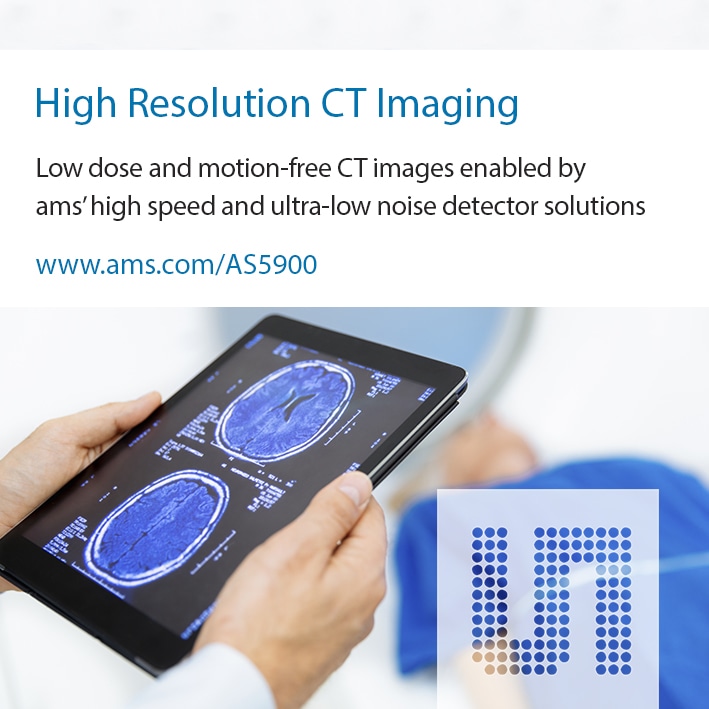Jun 29 2017
ams, also known as AMS, is a globally leading supplier of high performance sensor solutions. On 28th June, 2017, the company released a current-to-digital converter for use in Computed Tomography (CT) scanners. This converter offers excellent linearity, very high resolution and ultra-low noise.
 PA AS5900 medical imaging RGB (Credit: ams)
PA AS5900 medical imaging RGB (Credit: ams)
The exceptional analog performance of the AS5900 will allow new CT scanners to generate sharper and more detailed images. Medical CT scanners that use the AS5900 will feature an enhanced X-ray detector module, and will enable Physicians to generate more precise accurate diagnoses while subjecting patients to lower doses of radiation.
The AS5900 detector interface chip for CT X-ray scanners presents new performance benchmarks in vital parameters:
- Ultra-low noise: As little as 3,200 electrons for a full-scale range at an input current of 1 µA and 30 pF input capacitance. The circuit’s extremely high signal-to-noise ratio permits the flexible use of any pixel size, allowing it to digitize very low-current outputs from the newest high-sensitivity photodiodes. As a result, the CT scanner will be able to deliver more detailed images. Additionally, low noise enables CT equipment to maintain high spatial resolution while decreasing the X-ray dose to which the patient is exposed.
- Very low power dissipation: Power dissipation as low as 1mW per channel brings down the need for cooling capability in the CT scanner, reducing the overall system cost.
- High resolution: The 26-bit sigma delta ADC incorporated in the AS5900 helps in developing a richer grayscale palette for more detailed and sharper images.
- High linearity: ±250 ppm of Read inputs (±1 ppm of full-scale range) to provide enhanced contrast, precisely rendering minor variations in image brightness.
The new detector chip is capable of providing in depth motion-free medical images while working at extremely high acquisition rates: it is possible to set the adjustable integration time as low as 50 µs.
The detector’s configurable design allows it to be flexible enough for integration into various types of end equipment that use a multiple-slice photodiode array. The chip is considered to be perfect for use in medical equipment and also in security and industrial CT scanners. Equipment Designers can adjust or configure:
- gain setting, to configure the noise floor and the input-current full-scale range
- power modes, to adapt power consumption to the detector necessities
- clock frequency, to balance the resolution with the desired integration time
The AS5900 incorporates all the functions of a current-input ADC in order to minimize the need for external components. It comprises of an internal reference voltage and temperature sensor. This helps in reducing the bill of materials, thus reducing system cost. The detector also provides a standard LVDS interface to a host FPGA, operating at a data rate of up to 80 Mb/s for optimized power consumption.
The ultra-low noise and high resolution of the AS5900 will enable CT scanner OEMs to produce better images at higher full scale ranges, allowing for flexible pixel sizing. Medical practitioners will see a marked difference in the quality and clarity of images from the next generation of CT scanners based on this new, high-performance current-to-digital converter. Its low-noise operation at high speed and low power consumption produces CT images free of motion artefacts even at the highest rotational speeds while exposing the patient to a lower dose of radiation.
Josef Pertl, Product Marketing Manager at ams
The AS5900 is presently available in a 10 x 10mm² BGA package for sampling. Unit pricing is $1.00 for a single channel, or 128.00 for the 128-channel AS5900 in an order quantity of 1,000 units.
AMS also provides an evaluation board on request.